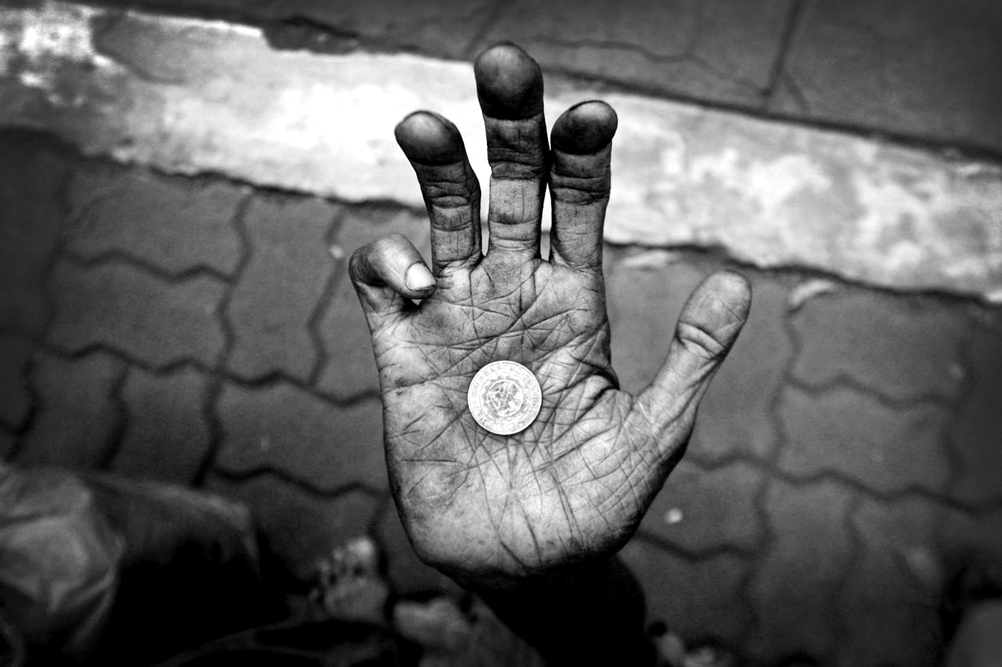
 The old woman’s fingers curled around a few coins, jiggling them, as she made her rounds to patrons in the café where I sat nursing a hot drink, waiting for the shops to open after closing for midday. Her voice was soft, cajoling as she begged a few coins from the customers.
The old woman’s fingers curled around a few coins, jiggling them, as she made her rounds to patrons in the café where I sat nursing a hot drink, waiting for the shops to open after closing for midday. Her voice was soft, cajoling as she begged a few coins from the customers.
There are very few beggars where I live. In a city of 200,000, the less-than-half-a-dozen I see routinely are either very elderly or are missing a leg or two. As an American living abroad for many years, I’ve witnessed a repeating pattern every tourist season. The locals routinely give the beggars a few coins. Tourists? Never.
Now, granted. Having been cheated repeatedly before because people incorrectly assume I’m rich, I understand the tourists assuming that they’re being targeted just because they are—predominantly—North American. That gets old really fast and fosters a strong suspicion against the locals. People who live here, though, view it differently. There is a very strong work ethic among the locals, so if a person is begging, people know there is a very real need. Furthermore, it’s reasonable that an elderly person in severe want, seeing you drinking a $2.50 coffee, would assume you could afford to give her 50¢ or a dollar.
Watching locals give a few coins to beggars while tourists repeatedly pretend not to see them, brings to mind one of Christ’s parables and a deeply buried truth that has been lost to modern readers.

One day, someone came to Yahushua and said, “Teacher, tell my brother to divide the inheritance with me.”
Yahushua replied, “Man, who appointed me a judge or an arbiter between you?” Then he said to them, “Watch out! Be on your guard against all kinds of greed; life does not consist in an abundance of possessions.”
And he told them this parable: “The ground of a certain rich man yielded an abundant harvest. He thought to himself, ‘What shall I do? I have no place to store my crops.’
“Then he said, ‘This is what I’ll do. I will tear down my barns and build bigger ones, and there I will store my surplus grain. And I’ll say to myself, “You have plenty of grain laid up for many years. Take life easy; eat, drink and be merry.”’
“But God said to him, ‘You fool! This very night your life will be demanded from you. Then who will get what you have prepared for yourself?’”
“This is how it will be with whoever stores up things for themselves but is not rich toward God.”(Luke 12:13-21, NIV)
Charity:“Provision of help or relief to the poor; almsgiving. Something given to help the needy; alms.” (The American Heritage Dictionary) |
This parable always confused me. I asked myself, What’s the lesson being taught here? That you’re not supposed to be rich? That you’re not supposed to build bigger barns? I finally decided that the man was called a fool because—don’t laugh. I seriously came to this conclusion—in his pursuit to show off his wealth, he decided to tear down his existing barns before building larger ones.
But that’s not what this is saying at all! The key to understanding this parable is found in the Israelite view toward charity.
Ancient Israel as a culture was extremely liberal. Allowance was made for the widow, the fatherless, and the foreigner. “When you reap the harvest of your land, do not reap to the very edges of your field or gather the gleanings of your harvest. Do not go over your vineyard a second time or pick up the grapes that have fallen. Leave them for the poor and the foreigner. I am the Yahuwah your God.” ( Leviticus 23:22, NIV)
Every seventh year, the land itself was to have a Sabbath rest during which time the harvest of anything that grew was to go to the poor. “Six years you shall sow your land and gather in its produce, but the seventh year you shall let it rest and lie fallow, that the poor of your people may eat; and what they leave, the beasts of the field may eat. In like manner you shall do with your vineyard and your olive grove.” (Exodus 23:10-11, NKJV) In fact, anyone who was hungry could take what they needed to assuage their hunger and this was not considered stealing. This is precisely what the disciples were doing in Matthew 12. The Pharisees were not accusing them of stealing the grain but, rather, by plucking the grain the disciples were “harvesting” it; by rubbing it between their hands to husk it, they were “winnowing.” In other words, working on the Sabbath day.
Clearly, the Israelites had a view of giving that has been lost to today’s Christians. This attitude is most clearly explained in Christ’s words in the sermon on the mount: “Do not store up for yourselves treasures on earth, where moths and vermin destroy, and where thieves break in and steal. But store up for yourselves treasures in heaven, where moths and vermin do not destroy, and where thieves do not break in and steal. For where your treasure is, there your heart will be also.” (Matthew 6:19-21, NIV) The reward for giving to the poor, according to Scripture, is very real: you lay up treasure in Heaven where the record of your actions is preserved until the day Yahushua returns and rewards the faithful.

This was not a new concept. Clear back during the Wilderness Wandering, Yahuwah commanded:
At the end of every three years, bring all the tithes of that year’s produce and store it in your towns, so that the Levites (who have no allotment or inheritance of their own) and the foreigners, the fatherless and the widows who live in your towns may come and eat and be satisfied, and so that Yahuwah your God may bless you in all the work of your hands. (Deuteronomy 14:28 & 29, NIV)
This is why Scripture says to give: so Yahuwah may bless you in everything you do.
People today are far more hesitant to give. We ask ourselves, What if he uses it to buy drugs or alcohol? What if she’s asking just because she assumes I’m American? What if they’re waiting to pick my pocket or steal my wallet?
The Israelites didn’t worry about such things. They gave freely and left the results with Yah. In fact, helping the poor was believed to provide an escape from damnation because it was viewed as giving to Yahuwah Himself. Thus, it became an act of highest worship and adoration of the Creator Himself.
Proverbs 10:2 declares: “Treasures of wickedness profit nothing: but righteousness delivereth from death.” (KJV) Modern dictionaries define “righteousness” as “a righteous act”1 and even Scripture contains this meaning of the word. “Righteousness” comes from the Hebrew word, tsedâqâh. It means morally upright, just, virtuous and includes virtuous acts. Thus, Proverbs 10:2 could just as readily be translated as “Treasures of wickedness profit nothing: but righteous acts delivereth from death.”
While a righteous act may, in some circumstances, certainly save the physical life, it has an even greater impact on the spiritual life. Giving to the poor, helping those in need, even when it requires self-sacrifice on your part, openly declares to the world your faith in a living God who takes care of and rewards His children. Proverbs 19:17 states, “He who has pity on the poor lends to Yahuwah, and He will pay back what he has given.” (NKJV)

Giving a dollar to a beggar is easy, but it cuts closer to home when you could really use the money yourself. When you help those in need—even when you could use that money yourself—you are exercising faith that Yahuwah will provide for you. It is a public statement of your faith that Yah will repay what you have given.
Paul praised the Philippians for their generosity in providing for him, stating that it was to their spiritual benefit, adding his assurance that Yah, in turn, would provide for them.
Now ye Philippians know also, that in the beginning of the gospel, when I departed from Macedonia, no church communicated with me as concerning giving and receiving, but ye only.
For even in Thessalonica ye sent once and again unto my necessity.
Not because I desire a gift: but I desire fruit that may abound to your account.
But I have all, and abound: I am full, having received of Epaphroditus the things which were sent from you, an odour of a sweet smell, a sacrifice acceptable, well-pleasing to God.
But my God shall supply all your need according to his riches in glory by Christ Yahushua. (Philippians 4:15-19, KJV)
Thus, the ancient Israelites and even the early Christians saw giving to the needy as an act of worship because in giving to the poor, you were encountering Yahuwah Himself. John Chrysostom, a fourth-century archbishop of Constantinople, taught that the poor could, in a real sense, be viewed as an altar for worshipping Yah. He wrote, “Whenever . . . you see a poor believer, imagine that you behold an altar. Whenever you meet a beggar, don’t insult him, but reverence him.” This may strike modern believers as a bit radical, but Christ himself taught this very thing in a powerful parable of the judgment.

When the Son of man shall come in his glory, and all the holy angels with him, then shall he sit upon the throne of his glory:
And before him shall be gathered all nations: and he shall separate them one from another, as a shepherd divideth his sheep from the goats:
And he shall set the sheep on his right hand, but the goats on the left.
Then shall the King say unto them on his right hand, Come, ye blessed of my Father, inherit the kingdom prepared for you from the foundation of the world:
For I was an hungred, and ye gave me meat: I was thirsty, and ye gave me drink: I was a stranger, and ye took me in:
Naked, and ye clothed me: I was sick, and ye visited me: I was in prison, and ye came unto me.
Then shall the righteous answer him, saying, Lord, when saw we thee an hungred, and fed thee? or thirsty, and gave thee drink?
When saw we thee a stranger, and took thee in? or naked, and clothed thee?
Or when saw we thee sick, or in prison, and came unto thee?
And the King shall answer and say unto them, Verily I say unto you, Inasmuch as ye have done it unto one of the least of these my brethren, ye have done it unto me.
Then shall he say also unto them on the left hand, Depart from me, ye cursed, into everlasting fire, prepared for the devil and his angels:
For I was an hungred, and ye gave me no meat: I was thirsty, and ye gave me no drink:
I was a stranger, and ye took me not in: naked, and ye clothed me not: sick, and in prison, and ye visited me not.
Then shall they also answer him, saying, Lord, when saw we thee an hungred, or athirst, or a stranger, or naked, or sick, or in prison, and did not minister unto thee?
Then shall he answer them, saying, Verily I say unto you, Inasmuch as ye did it not to one of the least of these, ye did it not to me.
And these shall go away into everlasting punishment: but the righteous into life eternal. (Matthew 25:31-46, KJV)
When we relieve the suffering of others in any way we can, we are in a very real way, relieving the suffering of the Father who feels everything they are feeling. Likewise, when we withhold help from those in need, we are withholding that from the Father Himself. Giving to others thus becomes a privilege and an act of worship.
The rich man in Yahushua’s parable was a fool, not because he was rich, or because he wanted to build bigger barns. He was a fool because his focus was on hoarding a treasure on earth rather than using it to help others. This would have given him a treasure in the record books of heaven.
The question we each need to ask ourselves is, what does my pattern of giving reveal about my faith in Yah?

1The Century Dictionary